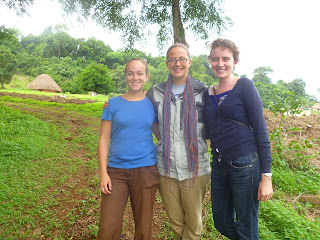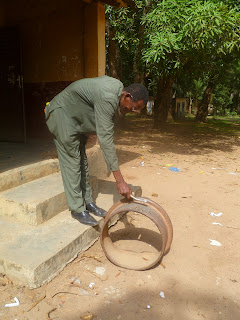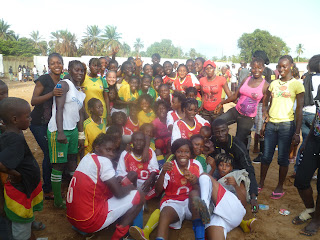After our crushing loss to Kamsar, one of the boys coaches stepped up to permanently help our team (and thank goodness because I have terrible French/Susu coaching skills). We played in a school tournament and beat one school and lost to a second in Boke. After said tournament, we organized another friendly match against Boke, this time on home turf. We invited all of the important people in our community, the students, and 2 other Peace Corps volunteers. People showed up in massive numbers to cheer us on. The game was awesome and we ended up winning 2-1. The next morning the chef of our district came to talk to me (with a Susu interpreter) and tell me how proud he is of the girls and of me. He has never seen young girls of our community so active and involved in something like this and he told us he will support us in whatever way he can.
Apparently word got out about our village soccer team and shortly after the game with Boke we were invited to a tournament in Boffa (a city 2 hrs away) organized by the governor of Conakry (!). It was a tournament with 8 girls teams from around the region including Boke, Kamsar, Fria, Dubreka, Koba, Sobanet and Boffa. Each team was to play 3 games, one every other day. When people in our community found out about this they all rallied behind the girls and encouraged us every day until we left.The tournament organizers dropped off money for our transport and on May 12th, 18 girls, 2 coaches, 1 professor, 1 journalist and I headed to Boffa.
After getting over the initial minor humps (for example: not having a place to sleep, not having anything to eat, and not having potable water), we had a great time. The logistical details were quickly (Guinean quickly, not American quickly) sorted out. The 18 girls and I slept on the floor in the living room of someone who lived behind the soccer stadium, we were delivered sachets of clean water, and we received a sack of rice and money to buy sauce. Nous nous sommes debrouillées.
The week was not without adventure, oh no. Each morning we got up at 6 am to have practice before the sun heated things up too much. During the day we relaxed at our home, making rice and sauce, braiding each other's hair, visiting our sisters from Boke (we became friends after we beat them), going to the market (and me being commissioned to find sanitary pads for the girls at the local pharmacy), doing laundry, having impromptu dance contests, eating mangoes, and playing cards. In the evenings we watched or played games and at night watched TV at a neighbors house who invited us over.

Our first game we lost 6-0 to Boffa who, as you can deduce by the score, destroyed us. In our defense, their team had girls 10+ years older than our girls. Our second game was well played, but we still couldn't match up to Fria and lost 2-0. One of my girls took an elbow to the ribcage and was having trouble breathing so her and I took a trip to Boffa's emergency room, where, thank goodness, we found out that the injury was not at all serious. The following day the girls on our team got in a fight with another team which resulted in girls throwing shoes at each other and hitting each other with sticks. I was really embarrassed and angry at the girls, but we sorted out our differences with the other team, and by the end of the tournament even became friends with some of them. Our last game was by far the best played and the most exciting, however we still lost 1-0 due to a penalty kick.
Despite our losses and misadventures, we were able to grow more as a team, make friends with the girls on other teams (“networking”), meet the officials in charge of sports in Boke and Boffa, and play some awesome soccer!
Eating mangoes and getting water at the hand pump


The other soccer coaches and my head after the girls had their way with it
Starting line-up
On the bench
All the girl soccer players from Boke prefecture (Boke, Kamsar and Kolaboui)
Heading home. Ooo Ooo














































